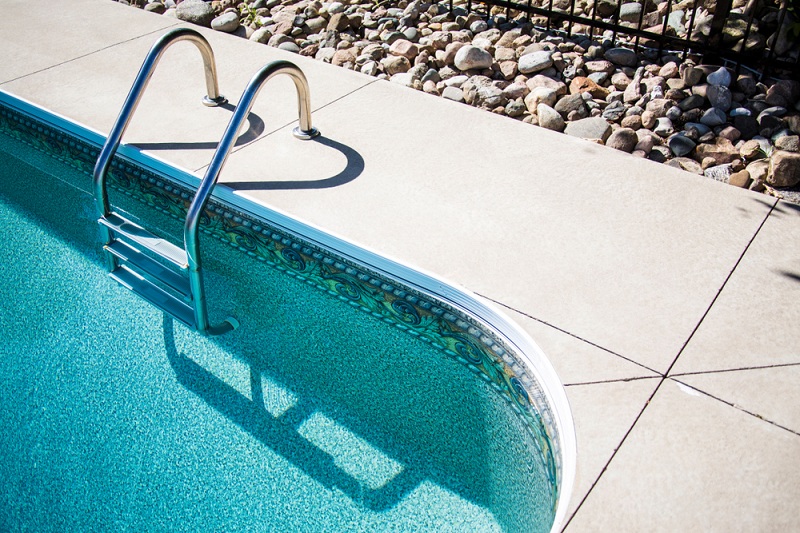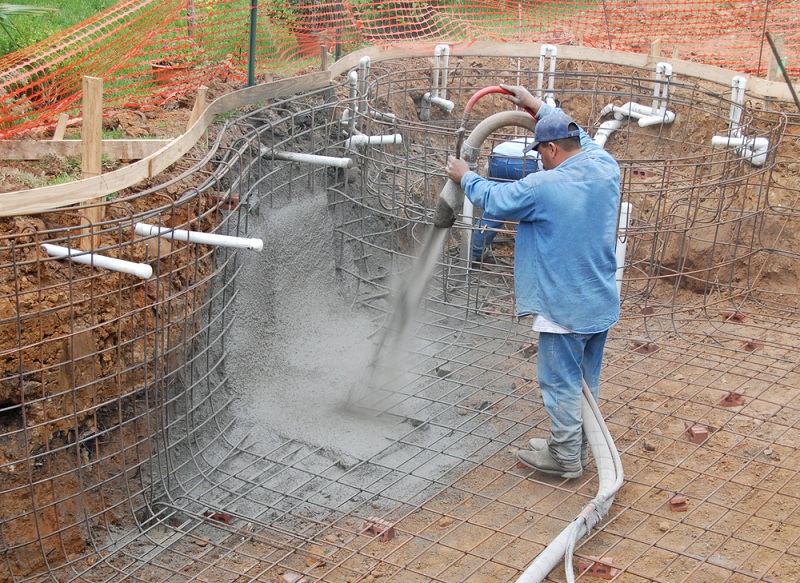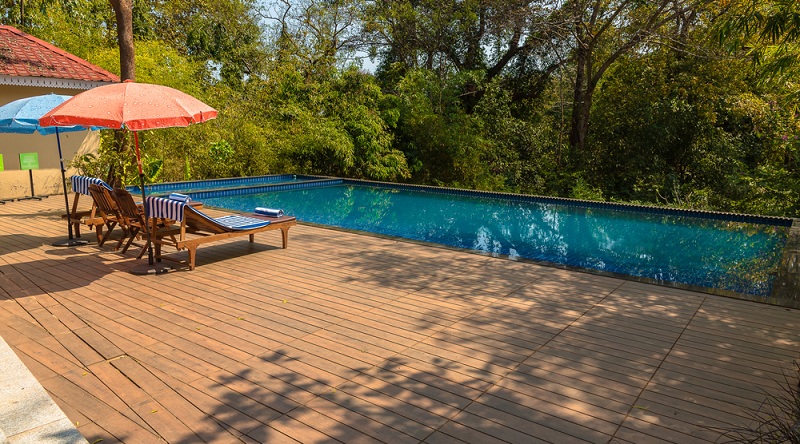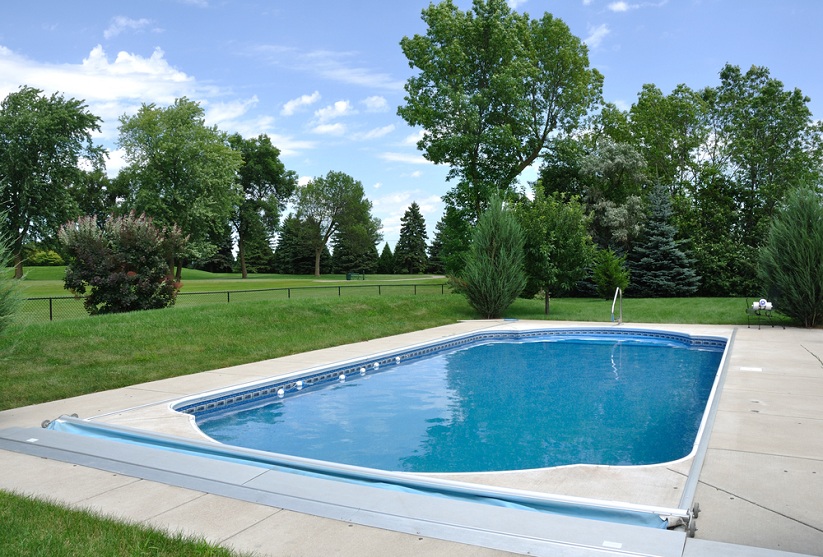Choosing between a concrete and a gunite pool can be difficult.
Gunite pools are more expensive, but are they worth it in every case?
Which should you choose?
In this short article, we’ll help you make that decision.
Concrete Pools

A concrete swimming pool comprises a concrete foundation and usually a fiberglass or vinyl liner.
First, concrete is poured into a form and then allowed to set.
A liner is then added to contain the water and to provide a softer surface for swimmers.
Pros
- Durable – Concrete pools are highly durable. They can withstand extreme weather conditions such as hurricanes and tornadoes.
- Easy to Install – Concrete pools are relatively simple to install. All you need is a cement mixer and a shovel.
- Waterproof – Concrete pools are waterproof. This means they won’t leak or allow water to seep into the ground.
Cons
- Expensive – Concrete pools cost significantly more than vinyl or fiberglass pools. However, they last much longer.
- Must Maintain Liners – Concrete pools require liners that can fail or get torn. In contrast, a gunite pool’s surface will not.
- Can Leak – Concrete pools are more prone to leaking. If there’s a crack in the concrete, it could cause a leak.
Gunite Pools

Gunite has two main characteristics that set it apart from concrete:
Unlike concrete, which uses large aggregate and small aggregate in its mix, gunite only uses smaller particles.
The other difference is when you add water to the mixture.
Concrete comes in a ready mix form. The material is mixed with water ahead of time, then applied.
With gunite, a dry mix is poured into a hose, delivering the wet & dry material to the point of application. It is a more precise and controllable way of applying concrete, which makes it the preferred choice for building more complex pool designs.
Unlike concrete, when constructing a gunite pool, you can stop and restart without any problems, which helps give a smoother finish.
A skilled gunite nozzleman can also adjust the mixture of cement and water at the point of delivery so that it is less prone to cracking than regular concrete.
Gunite can be more time-consuming to apply than concrete because it needs to be mixed on-site, and there could also be delays if the dry mix gets stuck in the pipes during the application process.
Gunite also requires more skill to install than concrete, but it can be messy because it’s easier to get too much over-spray or bounce.
Pros
- Easier to Maintain – Gunite pools are easier to maintain than concrete ones. All you need to do is apply a coat of paint every couple of years.
- Longer Lifespan – Gunite pools last longer than concrete pools with liners. They can last up to 50 years.
- Waterproofing – Gunite pools are truly waterproof. This prevents leaks and allows you to use the pool year-round.
Cons
- Difficult to Repair – Gunite pools are more difficult to repair than concrete pools. It takes a professional to fix any cracks or holes in the pool.
- Expensive – Gunite pools are generally more costly than concrete-liner pools.
Which Type of Pool Should You Choose?

The decision to build a concrete or gunite pool depends on several factors.
Cost – Gunite pools are generally more expensive than concrete pools.
Maintenance – Gunite pools are simpler to maintain than concrete pools, requiring less maintenance.
Waterproofing – Gunite is generally more waterproof.
Durability – Gunite pools are generally more resistant to leaks and surface issues than concrete pools with liners. The main disadvantage of concrete pools is that they are more susceptible to cracking.
Repair – Leaks in gunite pools are tougher to repair than in concrete pools with a liner, so you’ll need a pro to make repairs.
Design flexibility – Gunite pools are more popular than concrete pools for building larger, more complex designs. Due to increased precision and control, gunite can create more aesthetically pleasing pools.
Conclusion
In conclusion, both concrete and gunite pools are fine choices for swimming pools.
If you want an extra layer of assurance that your pool will not leak or need repairs during its useful life, or you plan to build a large and complex design, pay a little more for a gunite pool.
FAQs
Q: What is the difference between concrete and gunite pools?
A: Both concrete and gunite pools have their pros and cons. Concrete pools are generally cheaper than gunite pools but harder to maintain. Gunite pools are more durable and long-lasting, but they are more expensive.
Q: How much does it cost to build a gunite swimming pool?
A: It costs $25,000 to $100,000 to install a new gunite pool. This includes everything you need.
Q: Is it possible to get an estimate before building my pool?
A: Yes. Many local installers offer free online calculators to determine how much money you will spend on your new swimming pool.
Q: Can I buy a pre-built concrete or gunite pool instead of building one custom?
A: Yes. A handful of companies sell pre-cast concrete pools. Some of these companies include Plungie Pools and SP Pools.
Q: How long does it take to build a swimming pool yourself?
A: Most people can build a swimming pool in 1-2 months. However, some people might need up to 3 months or more, depending on the pool size.
Q: Do I need to hire someone to help me build my pool?
A: No, but we strongly recommend you do. You can build a swimming pool by yourselves if you know what you’re doing. But, if you don’t, you should hire an experienced pro to help you with the project.

